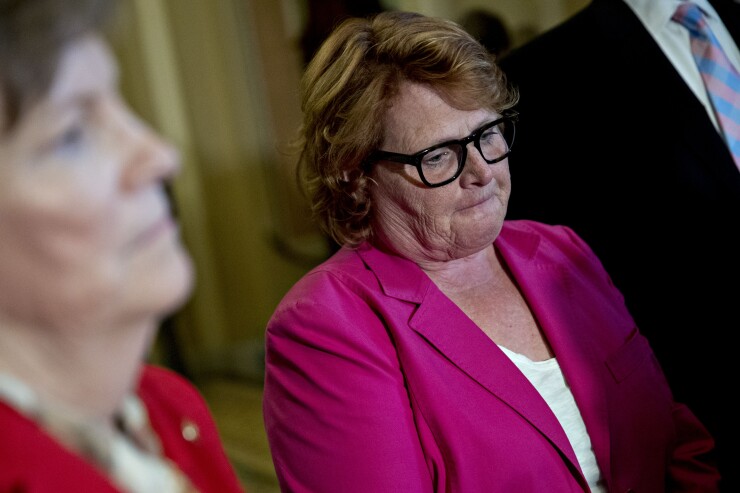WASHINGTON — Discussions on a regulatory relief package between the top Democrat and Republican on the Senate Banking Committee broke down late Tuesday night, but members from both sides of the aisle remain hopeful that they can reach a bipartisan deal.
Chairman Mike Crapo and Sen. Sherrod Brown, D-Ohio, the panel's ranking member, have been discussing ways to reform parts of the Dodd-Frank Act since the beginning of the year with initial optimism that they could come to an agreement. However, it appears that what Republicans wanted was too much for Brown, who is one of the Senate's more progressive members.
“I care about helping the small banks and the credit unions, but I wasn’t willing to gut consumer protections to do it,” Brown said in an interview.

But now with talks between Crapo and Brown being scrapped, moderate Democrats on the banking panel, including Sen. Heidi Heitkamp, D-N.D., plan to negotiate directly with Crapo. Yet it still remains unclear if they would be able to bring along other Democrats to support such a deal. A central piece of regulatory relief discussions is whether and how much to raise the $50 billion asset threshold qualifying "systemically important" banks for tougher supervision, or whether to abandon a hard numeric threshold altogether.
“I have long said that I am going to do everything that I can to achieve a bipartisan analysis that helps my community banks and my credit unions and I have not eliminated that goal,” Heitkamp said. “I continue to have that goal, and look forward to ongoing conversations.”
Despite the breakdown in talks, the mood in much of the credit union advocacy community remained positive -- or at least optimistic.
“This is disappointing but not surprising," said Ryan Donovan, chief advocacy officer with the Credit Union National Association. "And we hope it is not permanent. Bringing about common-sense regulation is a process. We hope both sides will continue to work together to put forth bipartisan legislation that focuses on many of the important issues that impact consumers and small financial institutions including credit unions.”
Any deal needs 60 votes to pass
Some lobbyists doubted that Brown would ever agree to a deal that would be amenable to Republicans and believe that a package negotiated with moderate Democrats will prove to be more fruitful in rolling back Dodd-Frank regulations. However, any deal will need to thread a needle because it will require the support of eight Democrats to get the 60 votes needed to pass, not just the four moderates on the Banking Committee
Crapo said he and Brown "did both work hard and in good faith" but "we were unable to reach an agreement."
But he said he has already started to negotiate with the moderate Democrats who have expressed a desire to make some Dodd-Frank reforms. Besides Heitkamp, other Democrats said to be involved in the talks are Sens. Jon Tester of Montana and Joe Donnelly of Indiana. It is unclear if Sen. Mark Warner, D-Va., is also part of the discussions, but he is seen as among the committee's more moderate Democrats.
“I intend to move forward to build a bipartisan solution,” said Crapo, who added that he still “hopes” a deal can be made by the end of the year.
Sen. Tim Scott, R-S.C., another member of the committee and a former credit union board member, signaled that Republicans and Democrats might not be too far apart on agreeing on some reforms.
“I think it is really important that we continue to look for ways to work with our friends on the other side to deliver relief from a regulatory standpoint,” said Scott.
Some industry observers said they think both sides will rehash discussions and pass a regulatory relief package late this year or early next, possibly even with Brown’s support.
“I believe that each side will take a breather and then they will go back at it either right at the end of the year or early next year,” said Camden Fine, president and chief executive of the Independent Community Bankers of America. “Chairman Crapo and Sen. Brown are both deal-makers and I think there is a deal to be made. It just may take some time to work through things.”
Yet some analysts suggested that Brown's lack of involvement in discussions poses an obstacle to an agreement.
Isaac Boltanksy, an analyst at Compass Point Research & Trading, said in a note to clients that while “we still see a path to passage for a targeted regulatory relief package in this Congress,” he lowered his odds that the Senate regulatory relief deal includes a change to the Dodd-Frank "systemically important" asset threshold to 50%.
Changing the $50 billion-asset threshold has been one of the more contentious debates on Capitol Hill. The industry has hoped that Brown, whose state of Ohio is home to a number of regional banks that want to see a higher threshold, would agree to such a change despite opposition from other Democrats including Sen. Elizabeth Warren of Massachusetts.
Ian Katz, a policy analyst at Capital Alpha Partners, wrote in a research note that the firm has been “contrarian optimists” that a Senate regulatory reform deal will include a change to the Dodd-Frank threshold but that “Brown’s support would have helped bring along a few more Democrats.”
However, it could be easier to come to an agreement now that it’s become clear what Brown will and won’t support.
“Both sides of the aisle want to get something done,” said James Ballentine, executive vice president of congressional relations and political affairs at the American Bankers Association. “Now that they know where the chess pieces are aligned, they can make the next move.”
Crapo said his objective remains unchanged.
“I want to build a bipartisan bill to achieve significant regulatory reform,” he said.





